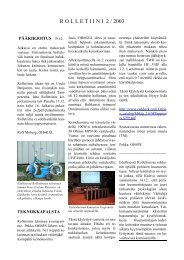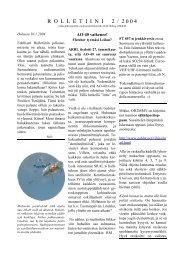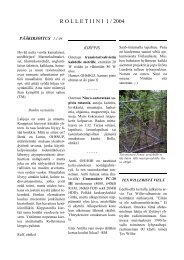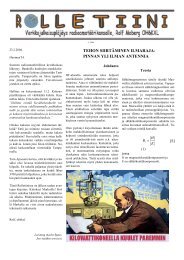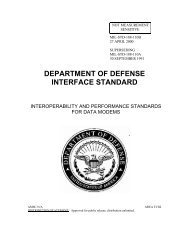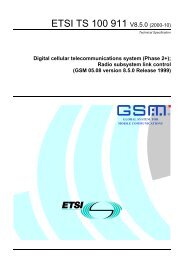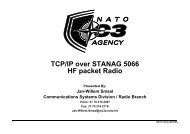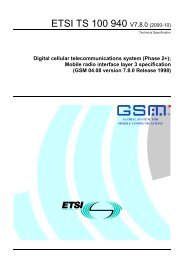nato unclassified - Ham-pages ... No indexes at this level
nato unclassified - Ham-pages ... No indexes at this level
nato unclassified - Ham-pages ... No indexes at this level
Create successful ePaper yourself
Turn your PDF publications into a flip-book with our unique Google optimized e-Paper software.
NATO UNCLASSIFIED<br />
STANAG 5066: PROFILE FOR MARITIME HF DATA COMMUNICATION<br />
V1.0.2<br />
The sending peer retrieves Client U_PDUs from its Queues (according to Priority and/or<br />
other criteria), encodes them into appropri<strong>at</strong>e DATA S_PDUs and sends them to its peer <strong>at</strong><br />
the remote end of the Link. A S_PDUs is submitted to the Channel Access Sublayer as a<br />
C_UNIDATA_REQUEST Primitive of the appropri<strong>at</strong>e priority or as a<br />
C_EXPEDITED_UNIDATA_REQUEST Primitive, depending upon whether the encoded<br />
U_PDU was submitted as a S_UNIDATA_REQUEST or as a<br />
S_EXPEDITED_UNIDATA_REQUEST Primitive by the Client.<br />
The Receiving Peer decodes the S_PDU and extracts from it the U_PDU, the Destin<strong>at</strong>ion<br />
SAP_ID and the other encoded <strong>at</strong>tributes described in Figure A-4. The U_PDU is then<br />
delivered to the Destin<strong>at</strong>ion Client as a S_UNIDATA_INDICATION Primitive or as a<br />
S_EXPEDITED_UNIDATA_INDICATION Primitive, depending upon whether the received<br />
S_PDU was submitted by the Channel Access Sublayer as C_UNIDATA_INDICATION<br />
Primitive or C_EXPEDITED_UNIDATA_INDICATION Primitive. If the received S_PDU<br />
has the “CLIENT DELIVERY CONFIRM REQUIRED” field set equal to “YES”, then the<br />
Receiving Peer must respond with either a “DATA DELIVERY CONFIRM” S_PDU (type 1)<br />
or a “DATA DELIVERY FAIL” S_PDU (type 2) depending upon whether the U_PDU was<br />
successfully delivered to the destin<strong>at</strong>ion Client or not. <strong>No</strong>rmally these response S_PDUs<br />
should have the same Priority (or be of “Expedited” form<strong>at</strong>) as the DATA S_PDU th<strong>at</strong><br />
caused them. However, as the Priority of these Response S_PDUs does not affect<br />
interoperability, it is left as an implement<strong>at</strong>ion issue.<br />
It should be noted th<strong>at</strong>, as shown in Figure A-3, there is no explicit indic<strong>at</strong>ion th<strong>at</strong> the<br />
S_PDU is a “normal” or an “expedited” one. The reason for <strong>this</strong> is th<strong>at</strong> the underlying<br />
sublayers are expected to tre<strong>at</strong> Expedited S_PDUs differently and implicitly pass the<br />
inform<strong>at</strong>ion to the receiving peer by (for example) delivering Expedited S_PDUs as<br />
C_EXPEDITED_UNIDATA_INDICATION Primitives r<strong>at</strong>her than normal<br />
C_UNIDATA_INDICATION Primitives.<br />
The procedures for exchanging DATA S_PDUs for both the Sending and Receiving Peers are<br />
shown in Figure A-7.<br />
NATO UNCLASSIFIED<br />
38



